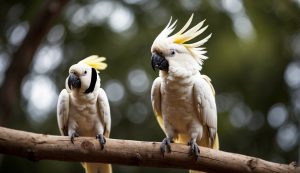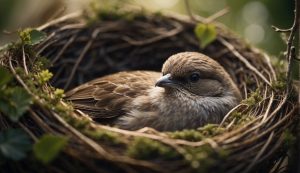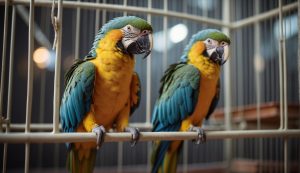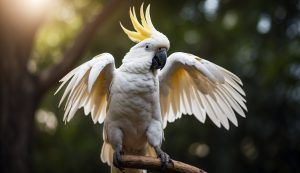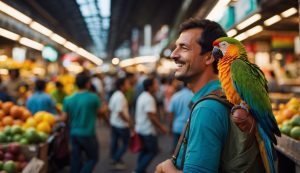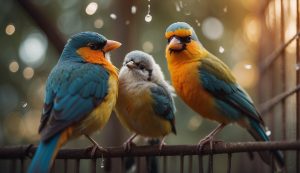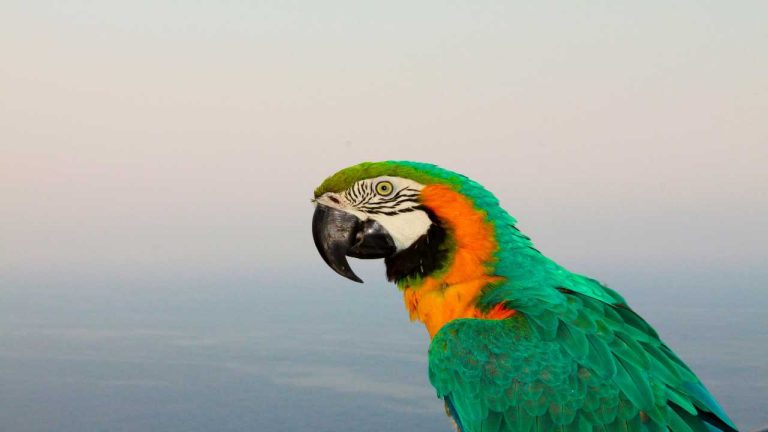What Can Baby Parrots Eat? A Guide to Safe and Nutritious Foods
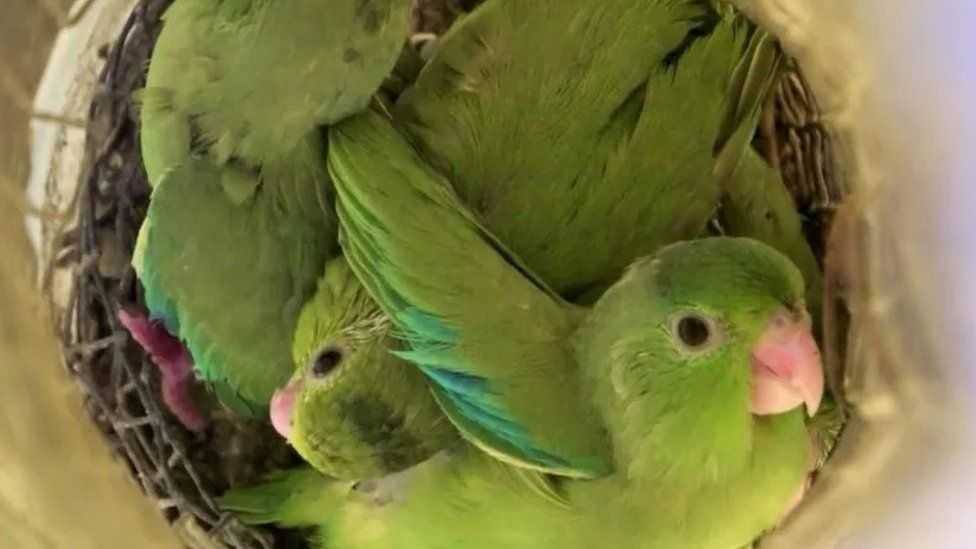
Baby parrots are adorable and delicate creatures that require special attention and care. One of the most important aspects of their care is their diet. Feeding a baby parrot the wrong foods can lead to serious health problems, so it’s essential to know what they can and cannot eat.
Understanding the dietary needs of baby parrots is crucial for their healthy growth and development.
Baby parrots require a balanced diet that includes a mix of protein, carbohydrates, fats, vitamins, and minerals.
They need more protein than adult parrots, and their diet should consist of soft, easily digestible foods, as they cannot handle hard foods at a young age.
Key Takeaways
- Baby parrots require a balanced diet that includes a mix of protein, carbohydrates, fats, vitamins, and minerals.
- Soft, easily digestible foods are essential for baby parrots as they cannot handle hard foods at a young age.
- It’s crucial to know what foods are safe and unsafe for baby parrots to prevent serious health problems.
Table of Contents
Understanding Baby Parrots
Baby parrots, also known as hatchlings, are born with closed eyes and are naked, blind, and deaf. They rely on their parents or caretakers for food, warmth, and protection. In the wild, baby parrots are fed regurgitated food by their parents. In captivity, baby parrots are usually fed a formula made of ground seeds, fruits, and vegetables that provide the necessary nutrients for their growth and development.
The size and species of the baby parrot will determine the amount and type of food they need. Larger species will require more food than smaller ones. As they grow, their diet will also change. For example, young fledglings will require more protein-rich foods than older parrots.
It is important to note that baby parrots should not be fed human food as it may not provide the necessary nutrients they need. Additionally, some human foods can be toxic to parrots. It is best to stick to a diet specifically formulated for parrots.
Baby parrots also require a warm and safe nest to grow in. In the wild, they will be found in nests built by their parents. In captivity, a suitable nest or enclosure should be provided to ensure their safety and comfort.
Overall, understanding the needs of baby parrots is crucial in ensuring their health and well-being. Providing them with a proper diet, warm and safe nesting environment, and proper care will help them grow into healthy and happy adult parrots.
Feeding Basics for Baby Parrots
Feeding a baby parrot can be a challenging task, but it is crucial to ensure their healthy growth and development. Here are some basics to keep in mind when feeding your baby parrot:
What to Feed
In the wild, baby parrots are fed food that their parents regurgitate. In captivity, baby parrots require a special hand-rearing formula that is available at most pet stores. The formula is made of ground ingredients like seeds, fruits, and vegetables that comprise the nutrients and are easy to digest after mixing them with water. You can also offer a variety of seeds, such as sunflower, safflower, and millet, cooked rice, pasta, or beans, and fresh fruits and vegetables like apple slices, banana, carrots, broccoli, and green beans.
How to Feed
Feeding a baby parrot requires patience and a gentle touch. You can use a syringe or a spoon to feed the formula to your baby parrot. Make sure to use a clean syringe and a clean towel to avoid any infections. If you are using a spoon, make sure it is not too deep or too shallow. You can also use tweezers to feed small bits of food to your baby parrot.
Feeding Schedule
Baby parrots require frequent feedings throughout the day. The feeding schedule varies depending on the age of the baby parrot. During the first two weeks, they need to be fed 5 to 10 times, every 2 to 3 hours per day. During the second and third weeks, they need to be fed 5 to 6 times, every 3 to 4 hours per day. During the third and fourth weeks, they need to be fed 4 to 5 times, every 4 hours per day. After the fourth week, they can be kept in a cage and fed 3 to 4 times per day.
Feeding a baby parrot can be a rewarding experience. By following these feeding basics, you can ensure that your baby parrot grows up healthy and strong.
Dietary Needs of Baby Parrots
When it comes to feeding baby parrots, it is important to provide them with a balanced and nutritious diet that meets their dietary needs. Baby parrots have specific nutritional requirements that must be met in order for them to grow and develop properly. Here are some dietary needs of baby parrots:
Balanced Diet
A balanced diet is essential for baby parrots. They require a combination of protein, fat, minerals, vitamins, calcium, antioxidants, and dietary fiber to grow and develop properly. A balanced diet will help ensure that your baby parrot gets all the nutrients they need to thrive.
Protein
Protein is an important nutrient for baby parrots. It is essential for growth and development, as well as for maintaining healthy feathers and muscles. Good sources of protein for baby parrots include cooked chicken, hard-boiled eggs, and pellet diets.
Fat
Fat is another important nutrient for baby parrots. It is essential for providing energy and maintaining healthy skin and feathers. Good sources of fat for baby parrots include nuts, seeds, and avocado.
Minerals and Vitamins
Baby parrots require a variety of minerals and vitamins to support their growth and development. Some important minerals and vitamins for baby parrots include calcium, vitamin A, vitamin D, and vitamin E. Good sources of these nutrients include leafy greens, carrots, and fortified pellet diets.
Antioxidants
Antioxidants are important for supporting a healthy immune system in baby parrots. Good sources of antioxidants include fruits and vegetables such as berries, apples, and broccoli.
Dietary Fiber
Dietary fiber is important for maintaining a healthy digestive system in baby parrots. Good sources of dietary fiber include fruits and vegetables, as well as pellet diets that are high in fiber.
Overall, it is important to provide your baby parrot with a balanced and nutritious diet that meets their specific dietary needs. By doing so, you can help ensure that your baby parrot grows and develops properly and stays healthy and happy for years to come.
Safe Foods for Baby Parrots
As a responsible parrot owner, it’s essential to know what foods are safe for your baby parrot. A well-balanced diet is crucial for the growth and development of your feathered friend. Here are some safe and healthy foods that you can feed your baby parrot.
Fruits and Vegetables
Fresh fruits and vegetables should make up a significant portion of your baby parrot’s diet. They are rich in vitamins, minerals, and fiber. Some fruits that are safe for baby parrots include bananas, apples, berries, and melons. Vegetables such as carrots, broccoli, green beans, and leafy greens like kale and spinach are also great options.
Seeds and Grains
Seeds and grains are an essential part of a baby parrot’s diet. However, it’s essential to offer them in moderation as they are high in fat. Some safe seeds for baby parrots include sunflower seeds, safflower seeds, and millet. Cooked grains like rice, oats, and barley are also safe and healthy.
Pellets
Pellets are a convenient way to provide your baby parrot with a balanced diet. They contain a mix of seeds, grains, and vitamins and minerals. However, it’s crucial to choose high-quality pellets that are specially formulated for baby parrots.
Legumes and Beans
Legumes and beans are an excellent source of protein and fiber for baby parrots. Cooked lentils, chickpeas, and black beans are safe and healthy options.
Nuts
Nuts are a great source of protein and healthy fats. However, they should be offered in moderation as they are high in fat. Safe nuts for baby parrots include almonds, walnuts, and pecans.
It’s essential to offer a variety of foods to your baby parrot to ensure they receive all the necessary nutrients for optimal health. Always ensure that the foods you offer are fresh, clean, and free from any pesticides or chemicals.
Foods to Avoid for Baby Parrots
When it comes to feeding baby parrots, it’s important to know which foods to avoid. Some foods can be toxic to parrots and can cause serious health problems. Here are some foods that you should avoid feeding baby parrots:
- Chocolate: Chocolate contains theobromine, which is toxic to parrots and can cause vomiting, diarrhea, seizures, and even death.
- Alcohol: Alcohol can cause serious health problems for parrots, including liver damage, kidney failure, and even death. It’s important to keep all alcoholic beverages away from your baby parrots.
- Avocados: Avocados contain persin, which can be toxic to parrots and can cause heart problems, respiratory distress, and even death.
- Caffeine: Caffeine can be toxic to parrots and can cause heart problems, seizures, and even death. It’s important to keep all caffeinated beverages away from your baby parrots.
- Peanuts: Peanuts can be a choking hazard for baby parrots, and they can also contain aflatoxins, which are toxic to parrots and can cause liver damage.
In addition to these foods, it’s important to avoid feeding baby parrots any food that is high in fat, salt, or sugar. These foods can lead to obesity, heart problems, and other health issues.
When feeding your baby parrots, it’s important to provide them with a balanced diet that includes a variety of fresh fruits and vegetables, as well as a high-quality pellet food. Always consult with a veterinarian or avian specialist if you have any questions or concerns about your baby parrot’s diet.
Special Considerations for Feeding Baby Parrots
Feeding baby parrots requires special attention and care. Here are some things to consider when feeding your baby parrot:
Age
The age of your baby parrot will determine how often and what kind of food they need. Young birds need regular feeding and eat more often than older birds. As they grow, you can gradually reduce the frequency of feeding. Consult with a veterinarian or licensed rehabilitator for specific feeding schedules based on your bird’s age and growth rate.
Stress and Injury
Stress and injury can affect a baby parrot’s appetite and ability to eat. If your bird is stressed or injured, consult with an experienced rehabilitator or veterinarian for guidance on how to feed and care for your bird.
Predators
Baby parrots are vulnerable to predators, both in the wild and in captivity. Ensure that your bird’s feeding area is secure and free from potential threats.
Force-Feeding
Force-feeding should only be done under the guidance of a veterinarian or licensed rehabilitator. Improper force-feeding can cause injury or illness.
Temperature
Baby parrots are sensitive to temperature changes. Keep your bird’s feeding area at a consistent temperature, ideally between 75-85°F. Use a heat lamp or other heating source if necessary, but be sure to monitor the temperature to prevent overheating.
Wild Birds and Parrots
If you are feeding a wild bird or parrot, it is important to provide a diet that closely mimics their natural diet. Consult with an experienced rehabilitator or veterinarian for guidance on what to feed wild birds and parrots.
Macaws
Macaws have unique dietary needs and require a diet rich in fruits, vegetables, and nuts. Consult with an experienced veterinarian or avian nutritionist for specific feeding recommendations for your macaw.
Cage and Psittacine Pediatrics
Proper cage setup and psittacine pediatrics are also important considerations when feeding baby parrots. Consult with an experienced avian veterinarian or rehabilitator for guidance on cage setup and psittacine pediatrics.
By following these guidelines, you can help ensure that your baby parrot receives the proper nutrition and care they need to grow and thrive.
Transitioning to Adult Parrot Diet
As baby parrots grow, they will transition from a diet of crop milk or formula to solid foods. Weaning typically occurs between 10 and 25 weeks of age, with larger birds taking longer to complete the process.
To help your baby parrot transition to an adult diet, it’s important to offer a variety of foods. This will help ensure that they receive all the necessary nutrients for optimal health.
When transitioning to an adult diet, it’s important to introduce new foods gradually. Start by offering small amounts of new foods alongside their usual diet. This will help prevent digestive upset and allow your parrot to adjust to new flavors and textures.
Adult parrots require a different diet than baby parrots. While baby parrots may eat a diet of regurgitated fruits, vegetables, grains, nuts, and seeds, adult parrots require a more varied diet that includes dry food, refrigerated food, and fresh fruits and vegetables.
Dry food, such as pellets, can be a good addition to your parrot’s diet. These foods are formulated to provide a complete and balanced diet and can be a convenient option for busy pet owners.
Refrigerated foods, such as cooked grains and vegetables, can also be a healthy addition to your parrot’s diet. These foods can be prepared in advance and stored in the refrigerator for several days.
Fresh fruits and vegetables should also be a regular part of your parrot’s diet. These foods provide important vitamins and minerals and can help keep your parrot healthy and happy. Try offering a variety of fruits and vegetables, such as apples, carrots, and leafy greens.
By gradually introducing new foods and offering a variety of fresh fruits and vegetables, you can help ensure that your baby parrot transitions to a healthy and balanced adult diet.
Emergency Measures and Rehabilitation
Feeding a baby parrot should be an emergency measure only. If you find an abandoned baby parrot, it should be taken to a bird rescue organization or experienced rehabilitator as soon as possible. These professionals have the knowledge and resources to provide the proper care and nutrition needed for the parrot’s survival.
In cases where immediate care is necessary, you can provide emergency feeding. The following guidelines set out how much food the average baby parrot needs:
- Young birds need regular feeding and eat more often than older birds.
- Feed the baby parrot a commercial hand-feeding formula, which can be purchased at a pet store or online.
- Follow the instructions on the package carefully and mix the formula according to the bird’s age and weight.
- Use a syringe or spoon to feed the baby parrot, being careful not to force the food into its mouth.
- Feed the baby parrot every 2-3 hours during the day, and once during the night.
It’s important to note that emergency feeding should only be done for a short period. The baby parrot should be taken to a professional as soon as possible for proper care.
In captivity, baby parrots should be fed a diet that is high in nutrients to avoid anemia and other health issues. A balanced diet for baby parrots should include:
- Commercial hand-feeding formula
- Fresh fruits and vegetables
- Pellets or seeds formulated for baby parrots
- Clean water
Always consult with a veterinarian or experienced bird breeder for specific feeding recommendations for your baby parrot.
Frequently Asked Questions
What are some safe vegetables for baby parrots to eat?
Baby parrots can safely eat a variety of vegetables such as carrots, sweet potatoes, green beans, peas, and leafy greens like kale and spinach. It is important to ensure that the vegetables are washed thoroughly and cut into small pieces to avoid any choking hazards.
What fruits are safe for baby parrots to eat?
Baby parrots can enjoy a variety of fruits such as apples, bananas, berries, melons, and grapes. It is important to remove any seeds or pits from the fruit before feeding it to the parrot.
Like vegetables, fruits should be washed and cut into small pieces.
What is a recommended feeding schedule for baby parrots?
Baby parrots should be fed a balanced diet of pellets, fruits, and vegetables. They should be fed small amounts of food several times a day, with fresh water available at all times.
It is important to monitor their weight and adjust their feeding schedule accordingly.
What homemade food options are available for feeding baby parrots?
Homemade baby parrot food options include cooked rice, pasta, and beans, as well as scrambled eggs and pureed fruits and vegetables. It is important to avoid seasoning the food with salt, sugar, or spices.
Can baby parrots eat baby food from the grocery store?
Baby food from the grocery store can be fed to baby parrots, but it is important to choose options that do not contain added sugars or salt.
It is also important to ensure that the baby food is appropriate for the parrot’s age and size.
Do baby parrots enjoy eating chillies?
It is not recommended to feed baby parrots chillies as they can cause digestive issues and discomfort. It is best to stick to a balanced diet of pellets, fruits, and vegetables for their nutritional needs.

